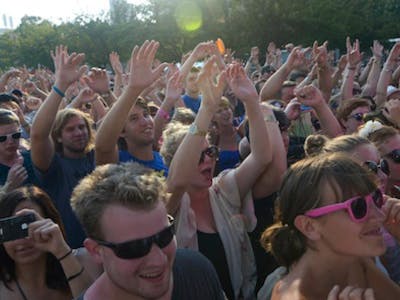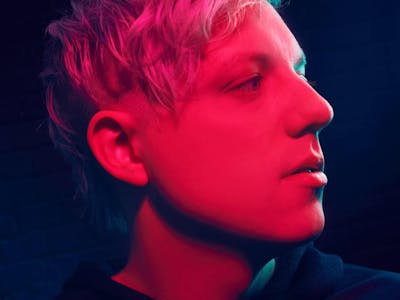Every now and again you stumble across a musician who is pushing the boundaries of music production and performance into new and exciting areas. Just Movement, the latest project from Robert DeLong, fuses elements of EDM, house and world beat rhythms into a one-of-a-kind original work of art that engages both the mind and body. His live show is no less captivating; blending live percussion, hacked video game controllers, looped keys and effects into a fanboys dream of turning music into a game to be played for our enjoyment. DeLong has managed to carve a niche that allows him to travel the world doing what he loves; making music that moves people. We caught up with him to talk about music festivals, hardware hacks and his album.
CincyMusic.com: Thanks for taking a few minutes to sit down and chat with us. Even though you're not a local artist, you're coming into town for Bunbury, one of the premiere music festivals in Cincinnati. How does it feel to be on a bill with huge national acts, midsize regionals and up and coming locals?
Robert Delong: I always try to check out as much as I can. My favorite acts to see are the local and underground artists. I can see nationals anytime. Usually festivals are pretty busy. Sometimes you drive in, set up, warm up, play your set and then leave to make the next date. Fortunately, I'm gonna be around for this one.
CM: Do you get very much opportunity to interact with the local and underground acts?
RD: Most interaction happens in the artist's compound. If there are free drinks, you can interact with other artists pretty easily.
CM: Amen! I love that! I imagine you do quite of bit of networking out in LA. Where are you from originally?
RD: I grew up in Seattle and about 9 years ago I moved to LA. Both of those cities have had a huge influence on my music. I was high school when a lot of the indie pop bands were coming up; Bands like Death Cab (For Cutie) and Modest Mouse. And a bunch of underground stuff like Jeremy Enigk, (the front man for Sunny Day Real Estate), and Dave Bazan (lead singer of Pedro the Lion and Headphones.) That (songwriting) had a huge influence on the way I write melodies and lyrics. Then I moved down to LA I started getting into electronic music and the dance scene.
CM: Cool! That's got me thinking. Based on your musical influences, I'm trying to figure out when you graduated high school. 2005? 2006?
RD: Pretty close! 2004. (You're) Not that far off.
CM: So how did you get started as a musician in the first place?
RD: My dad was a drummer, so I just grew up around music all my life. I remember weekend mornings, my dad blasting big band music and my five year old self just dancing around. I was about 10 or 12 when I started taking drum lessons. It wasn't until I got into high school that I started taking it seriously. That was about the time I started recording and messing around with electronic music and producing.
CM: Sounds like you got both nature and nurture in your background. I'd bet your pretty well rounded musically. How many instruments do you play?
RD: Drums are the only instrument that I really studied formally. But in college I had to take piano classes. But I'm a nominal piano player. I'm pretty sure I know more about piano than what I can play. I play guitar like every dude, I guess. Those are the instruments I can actually perform on stage with. And I also play with game controllers and knobs and sliders and weird stuff like that.
CM: Which is so cool. How do you even come up with the idea of using video game controllers to perform?
RD: I just saw that people online were hacking these things and doing all kinds of crazy stuff. So I started messing around with it and found that it's actually a little bit easier than you might think. I mean you can hook them up to your laptop via USB or Bluetooth. The Wii remote is Bluetooth. A bunch of my controllers are USB. Then I use software to convert it (the signal) from USB to midi: That's the language that my music production software can understand. Then you can do whatever you want with it. You can manipulate synthesizer parameters, delays on your vocals, all kinds of cool stuff. It's a lot of fun. And I know it can sound really simple when I break it down, but it still takes a lot of time and scaling to get it right. And of course, there's obviously a lot of trouble shooting.
CM: It kind of sounds like mapping DJ controllers and software.
RD: It's the same concept just a different interface. The main difference is these things weren't designed for music. It's a little bit more involved to make it work seamlessly. But it's like anything, you spend enough time and energy trying to make it work perfectly; testing it, practicing with it until you get it.
CM: Do you ever have any on stage tech failures?
RD: With the game controllers, not so much. Maybe a couple of times, but it's never a show stopper. I have had my computer overheat a couple of times, but I think we're past that.
CM: Was that at an outdoor gig?
RD: Yeah, an outside gig with the sun shining directly on the computer and you can't really do anything about it at that point.
CM: Oh I beg to differ. I was doing a gig once and I literally had bags of ice on the keyboard and cups of ice on the side. (I was) Just doing anything possible to keep it from crashing. Sometimes the hacks are technical and sometimes they're very nontechnical, but It worked.
RD: I'll have to remember that if I'm ever in a pinch.
CM: Is it difficult to incorporate the the live aspect of your show with the electronic aspect?
RD: I think it just comes from performing a lot, especially with bands. Some of the bands that I played with would use some loops. I've done a lot of recording too. So I'm used to the idea of playing to a click and jamming over loops. It started off as something as a fun thing to mess around with and then it grew into this monster.
CM: So you're evolving as an artist. That's always good. You've talked a little about your influences and the fact that you're growing artistically. How would you describe the music that you're making now?
RD: I would say something like Indie songwriter meets EDM, with a bit of a wild live performance featuring lots of toys.
CM: That spans the gamut. Who are some of your current influences?
RD: This album was written over four years so there were a bunch of different influences to it. Right now I'm on a lot of Talking Heads, David Bowie, and some hypnotic techno stuff like Lucy (Parisian producer.) I'm always listening to everything, especially when I go out to shows. I like Grouplove. They're a really fun band. I like a wide range of things. The music (I make) spans a lot of genres. That's what it's all about for me. Staying open to new things.
CM: What's the inspiration for your current album?
RD: There's this repeated lyric "I wanna know where we're going?" I used it on three different songs. It's something that kind of popped into my head while I was driving. I liked it and it kept bouncing around in my head so I came up with a melody. Later on, I figured out a way to write some songs around it.
CM: That sounds a little philosophical.
RD: Well, the record started to coalesce right after I graduated college which for me was a time of new freedom and of new questioning. Maybe the philosophical undertones come from that. And I'm a nerdy dude. I like to read Popular Science and watch TED Talks. So I think a lot of that stuff kind of seeps in there.
CM: There's no shame in being a nerd. I'm glad you stepped up and owned that. In case you didn't know, nerds rule the world now. Gates, Zuckerberg, Musk, Page & Brin. Those guys changed the world. That said, what is it that you want fans to take away from your music?
RD: Most of all I want people to have a good time. It's cool when people take away a lot of different things. I've seen people at shows that are like "Man, I really like your lyrics." And I've seen people at shows that are just sweaty because they had a good time dancing. They might not care about the lyrics at all. I just want fans to be able to take whatever they want from it and hopefully it makes them happy for a little while.
CM: Well your music is layered in terms of loops, instrumentation, effects, and the live performance. I think it's cool that what fans take away can be layered as well.
RD: The most inspiring to me is when a fan says "I went to your show and it made me want to go home and make music."; or paint or do whatever it is they do. For me, creating creative inspiration in others is the most exciting thing. It's what drives me.
Win passes to Bunbury Music Festival HERE!
Robert Delong
Bunbury Music Festival
Saturday July 13th
Main Stage
4:15p



